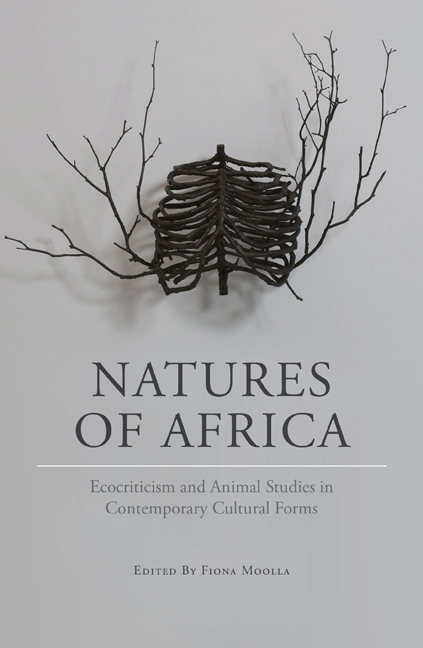Book contents
- Frontmatter
- Table of Contents
- Foreword
- Introduction
- 1 ‘Here is Some Baobab Leaf!’: Sunjata, Foodways and Biopiracy
- 2 Shona as a Land-Based Nature-Culture: A Study of the (Re)Construction of Shona Land Mythology in Popular Songs
- 3 The Environment as Significant Other: The Green Nature of Shona Indigenous Religion
- 4 Animal Oral Praise Poetry and the Samburu Desire to Survive
- 5 The Paradoxes of Voluntourism: Strategic Visual Tropes of the Natural on South African Voluntourism Websites
- 6 Towards an Ecocriticism in Africa: Literary Aesthetics in African Environmental Literature
- 7 Critical Intersections: Ecocriticism, Globalised Cities and African Narrative, with a Focus on K. Sello Duiker's Thirteen Cents
- 8 Navigating Gariep Country: Writing Nature-Culture in Borderline by William Dicey
- 9 Negotiating Identity in a Vanishing Geography: Home, Environment and Displacement in Helon Habila's Oil on Water
- 10 Human Masks? Animal Narrators in Patrice Nganang's Dog Days: An Animal Chronicle and Alain Mabanckou's Memoirs of a Porcupine
- 11 Nature, Animism and Humanity in Anglophone Nigerian Poetry
- 12 Animals, Nostalgia and Zimbabwe's Rural Landscape in the Poetry of Chenjerai Hove and Musaemura Zimunya
- About the authors
- Acknowledgements
- Notes
- Index
5 - The Paradoxes of Voluntourism: Strategic Visual Tropes of the Natural on South African Voluntourism Websites
Published online by Cambridge University Press: 10 May 2018
- Frontmatter
- Table of Contents
- Foreword
- Introduction
- 1 ‘Here is Some Baobab Leaf!’: Sunjata, Foodways and Biopiracy
- 2 Shona as a Land-Based Nature-Culture: A Study of the (Re)Construction of Shona Land Mythology in Popular Songs
- 3 The Environment as Significant Other: The Green Nature of Shona Indigenous Religion
- 4 Animal Oral Praise Poetry and the Samburu Desire to Survive
- 5 The Paradoxes of Voluntourism: Strategic Visual Tropes of the Natural on South African Voluntourism Websites
- 6 Towards an Ecocriticism in Africa: Literary Aesthetics in African Environmental Literature
- 7 Critical Intersections: Ecocriticism, Globalised Cities and African Narrative, with a Focus on K. Sello Duiker's Thirteen Cents
- 8 Navigating Gariep Country: Writing Nature-Culture in Borderline by William Dicey
- 9 Negotiating Identity in a Vanishing Geography: Home, Environment and Displacement in Helon Habila's Oil on Water
- 10 Human Masks? Animal Narrators in Patrice Nganang's Dog Days: An Animal Chronicle and Alain Mabanckou's Memoirs of a Porcupine
- 11 Nature, Animism and Humanity in Anglophone Nigerian Poetry
- 12 Animals, Nostalgia and Zimbabwe's Rural Landscape in the Poetry of Chenjerai Hove and Musaemura Zimunya
- About the authors
- Acknowledgements
- Notes
- Index
Summary
The world of voluntourism is a peculiar one. To present how the concept of the natural is used in the promotion of voluntourism, and to discuss the paradoxes and dilemmas of this usage, I shall introduce voluntourism's global dynamic by means of a parable.
Imagine you are John. John lives in a hypothetical neighbourhood made up of well-built, attractive houses. In this suburb, all is well and everyone seems happy with his or her home. But the edge of happiness is visible. On the border of the neighbourhood is a wall. John is able to look over the wall and make out the contours of life on the other side. It seems that people are building houses, but the view is somewhat obscured. From his secure and comfortable house, John starts getting the feeling that the people on the other side of the wall might need some help constructing their homes. But the wall itself also draws John's attention. The wall is mesmerising, as it is covered with notices and posters and advertisements and billboards. John gets the feeling that he ought to go over to help the people on the other side to build their houses. It is not clear whether his feelings spring from within himself or whether he has been led by the captivating notices on the wall. Whatever the case, John decides that he will go to the other side of the wall to offer his assistance.
Quite unexpectedly, John gets stopped at the wall by a man who looks well meaning. He warns John about some of the difficulties and dangers for someone like John on the other side, and explains that he can help John achieve his aims. Even though John could quite easily have gone through the gate to the other side of the wall of his own accord, he now is overtaken by caution and listens to the man. In the communication that develops, it turns out that to provide his help, the man at the gate demands that John pay him. The man explains that if John wants to help these people, then the best way would be to give them building materials.
- Type
- Chapter
- Information
- Natures of AfricaEcocriticism and Animal Studies in Contemporary Cultural Forms, pp. 118 - 140Publisher: Wits University PressPrint publication year: 2016

